Management and Operations: Leadership Roles and Approaches Analysis
VerifiedAdded on 2020/10/22
|13
|3869
|475
Report
AI Summary
This report delves into the multifaceted world of management and operations, focusing on the roles of leaders and managers within the context of Unilever. It begins by differentiating between the characteristics and responsibilities of leaders and managers, highlighting their distinct contributions to organizational objectives. The report then examines how leadership and management functions adapt to various situational contexts, such as conflict management, employee turnover, and productivity improvement. Furthermore, it explores different leadership theories, including situational, systems, and contingency theories, and their practical applications. Key approaches to operations management, such as Six Sigma, are analyzed, emphasizing the importance of operations management in achieving business goals. Finally, the report identifies factors that influence operational management and decision-making by leaders and managers, providing a comprehensive overview of effective leadership and operational strategies. The report is a valuable resource for students seeking to understand the intricacies of management and operations in a real-world business setting, supported by insights from Unilever's operational practices.

MANAGEMENT AND
OPERATIONS
OPERATIONS
Paraphrase This Document
Need a fresh take? Get an instant paraphrase of this document with our AI Paraphraser

Table of Contents
INTRODUCTION...........................................................................................................................3
TASK 1............................................................................................................................................4
P1) Different roles and characteristics of a leader and a manager..............................................4
TASK 2............................................................................................................................................6
P2) The role of a leader and the function of a manager apply in different situational contexts. 6
P3) Different theories and models of approach...........................................................................7
TASK 3............................................................................................................................................8
P4) Key approaches to operations management and role of leaders and managers ..................8
P5) Importance and value of operations management in achieving business objectives.........10
TASK 4..........................................................................................................................................10
P6) Factors that impact upon operational management and decision-making by leaders and
managers...................................................................................................................................10
CONCLUSION..............................................................................................................................11
REFERENCES..............................................................................................................................12
INTRODUCTION...........................................................................................................................3
TASK 1............................................................................................................................................4
P1) Different roles and characteristics of a leader and a manager..............................................4
TASK 2............................................................................................................................................6
P2) The role of a leader and the function of a manager apply in different situational contexts. 6
P3) Different theories and models of approach...........................................................................7
TASK 3............................................................................................................................................8
P4) Key approaches to operations management and role of leaders and managers ..................8
P5) Importance and value of operations management in achieving business objectives.........10
TASK 4..........................................................................................................................................10
P6) Factors that impact upon operational management and decision-making by leaders and
managers...................................................................................................................................10
CONCLUSION..............................................................................................................................11
REFERENCES..............................................................................................................................12

INTRODUCTION
Operations and management are two terms of operations management. Operations
management deals with designing and controlling the process of production. It is also related
with administration of different operations of a company to achieve highest level of efficiency in
the working of business. It requires the management of production of goods and services.
Unilever is a British-Dutch company headquartered in Mumbai, Maharashtra. It was established
in 1933 as Lever Brothers. It deals in foods, cleaning agents, personal care products etc. The
Report will emphasize on different roles of a leader and a manager, how the role of leader and
manager applies in organizational context. The Report will further explain different theories of
approach, importance of operations management in achieving business objectives and factors
that impact the decision making of leader and manager.
TASK 1
P1) Different roles and characteristics of a leader and a manager.
Leader- A leader is an important part of an organization. Leader plays an important role in
guiding the subordinates and gives the direction to their efforts in achieving organizational
objectives. Also helps in influencing the employees through proper communication.
Manager- Management means, getting the work done from others at right time. Manager of the
company is responsible for performing all the managerial functions. It is an activity that aims to
co-ordinates the efforts of employees to achieve organisational goals.
BASIS OF DIFFERENCE LEADER MANAGER
1) Leading and directing Leader of Unilever plays an
important role in describing
the purpose of working in a
group to their team members.
And gives the direction to the
efforts of subordinates to
achieve organizational goals
effectively and efficiently.
First of all leader allocates the
work to all the team members
Manager of Unilever plays an
important role in planing,
recruitment and selection of
suitable team members.
Manager collects feedback
from leader of the team then
takes corrective actions to
improve the performance of
subordinates (Ivanov, 2017).
Senior Manager of Unilever is
Operations and management are two terms of operations management. Operations
management deals with designing and controlling the process of production. It is also related
with administration of different operations of a company to achieve highest level of efficiency in
the working of business. It requires the management of production of goods and services.
Unilever is a British-Dutch company headquartered in Mumbai, Maharashtra. It was established
in 1933 as Lever Brothers. It deals in foods, cleaning agents, personal care products etc. The
Report will emphasize on different roles of a leader and a manager, how the role of leader and
manager applies in organizational context. The Report will further explain different theories of
approach, importance of operations management in achieving business objectives and factors
that impact the decision making of leader and manager.
TASK 1
P1) Different roles and characteristics of a leader and a manager.
Leader- A leader is an important part of an organization. Leader plays an important role in
guiding the subordinates and gives the direction to their efforts in achieving organizational
objectives. Also helps in influencing the employees through proper communication.
Manager- Management means, getting the work done from others at right time. Manager of the
company is responsible for performing all the managerial functions. It is an activity that aims to
co-ordinates the efforts of employees to achieve organisational goals.
BASIS OF DIFFERENCE LEADER MANAGER
1) Leading and directing Leader of Unilever plays an
important role in describing
the purpose of working in a
group to their team members.
And gives the direction to the
efforts of subordinates to
achieve organizational goals
effectively and efficiently.
First of all leader allocates the
work to all the team members
Manager of Unilever plays an
important role in planing,
recruitment and selection of
suitable team members.
Manager collects feedback
from leader of the team then
takes corrective actions to
improve the performance of
subordinates (Ivanov, 2017).
Senior Manager of Unilever is
⊘ This is a preview!⊘
Do you want full access?
Subscribe today to unlock all pages.

Trusted by 1+ million students worldwide
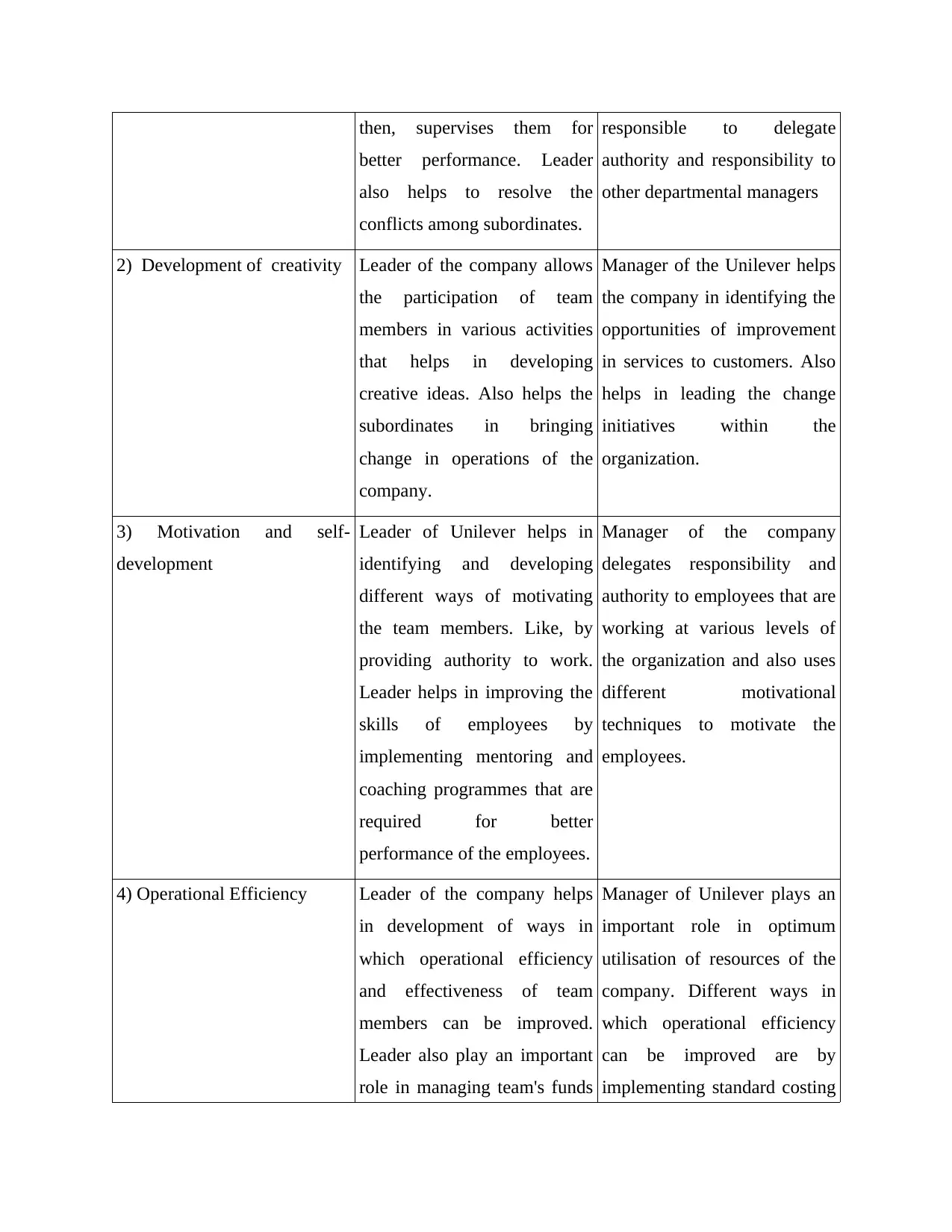
then, supervises them for
better performance. Leader
also helps to resolve the
conflicts among subordinates.
responsible to delegate
authority and responsibility to
other departmental managers
2) Development of creativity Leader of the company allows
the participation of team
members in various activities
that helps in developing
creative ideas. Also helps the
subordinates in bringing
change in operations of the
company.
Manager of the Unilever helps
the company in identifying the
opportunities of improvement
in services to customers. Also
helps in leading the change
initiatives within the
organization.
3) Motivation and self-
development
Leader of Unilever helps in
identifying and developing
different ways of motivating
the team members. Like, by
providing authority to work.
Leader helps in improving the
skills of employees by
implementing mentoring and
coaching programmes that are
required for better
performance of the employees.
Manager of the company
delegates responsibility and
authority to employees that are
working at various levels of
the organization and also uses
different motivational
techniques to motivate the
employees.
4) Operational Efficiency Leader of the company helps
in development of ways in
which operational efficiency
and effectiveness of team
members can be improved.
Leader also play an important
role in managing team's funds
Manager of Unilever plays an
important role in optimum
utilisation of resources of the
company. Different ways in
which operational efficiency
can be improved are by
implementing standard costing
better performance. Leader
also helps to resolve the
conflicts among subordinates.
responsible to delegate
authority and responsibility to
other departmental managers
2) Development of creativity Leader of the company allows
the participation of team
members in various activities
that helps in developing
creative ideas. Also helps the
subordinates in bringing
change in operations of the
company.
Manager of the Unilever helps
the company in identifying the
opportunities of improvement
in services to customers. Also
helps in leading the change
initiatives within the
organization.
3) Motivation and self-
development
Leader of Unilever helps in
identifying and developing
different ways of motivating
the team members. Like, by
providing authority to work.
Leader helps in improving the
skills of employees by
implementing mentoring and
coaching programmes that are
required for better
performance of the employees.
Manager of the company
delegates responsibility and
authority to employees that are
working at various levels of
the organization and also uses
different motivational
techniques to motivate the
employees.
4) Operational Efficiency Leader of the company helps
in development of ways in
which operational efficiency
and effectiveness of team
members can be improved.
Leader also play an important
role in managing team's funds
Manager of Unilever plays an
important role in optimum
utilisation of resources of the
company. Different ways in
which operational efficiency
can be improved are by
implementing standard costing
Paraphrase This Document
Need a fresh take? Get an instant paraphrase of this document with our AI Paraphraser

to perform various functions of
the company.
techniques, budgeting
technique etc.
TASK 2
P2) The role of a leader and the function of a manager apply in different situational contexts.
Situational context explains the reason behind occurrence of something. And what should
be the appropriate behaviour to deal with such situation. Context is any circumstances, situation,
or a specific setting in which some event occurs. It is defined by the event itself.
Conflicts Management - Conflict occurs due to misunderstanding between various
people. Or, it can happen due to difference of point of view, difference of interest, and
interpersonal differences etc. Conflict can be interpersonal, intra personal and organizational
(Little, 2016).
Role of a Leader- Leader of Unilever plays an important role in managing the conflict that
is occurring in the organization among various employees. Leader uses different techniques of
managing the conflicts through proper direction and guidance to subordinates. Like, integrating
the different functions of company, negotiation and accommodation etc. Different strategies that
leader of the company uses to resolve the conflicts are collaborating with team members for
mutual benefit, trying to resolve the conflict with a solution that partially satisfies everyone.
Role of a Manager- Manager of Unilever also play an important role in resolving the
conflicts occurring at workplace in different ways. Firstly, manager acts as an investigator
means, investigating the reasons behind happening of conflict between the employees.
Departmental Manager's collaborates top level management in developing strategies to resolve
conflicts (Wu, 2017).
Labour Turnover- It refers to number of employees that leaves an organization. It is of
two types voluntary and non-voluntary turnover.
Role of a Leader- Specific leadership skills of leader helps in reducing the employee’s
turnover.
Leader of Unilever uses reward and recognition strategy that includes, rewarding
employees for better performance. Leader of the company provides opportunities to employees
for their career development. Leader plays an important role in cultivating a respectful workplace
the company.
techniques, budgeting
technique etc.
TASK 2
P2) The role of a leader and the function of a manager apply in different situational contexts.
Situational context explains the reason behind occurrence of something. And what should
be the appropriate behaviour to deal with such situation. Context is any circumstances, situation,
or a specific setting in which some event occurs. It is defined by the event itself.
Conflicts Management - Conflict occurs due to misunderstanding between various
people. Or, it can happen due to difference of point of view, difference of interest, and
interpersonal differences etc. Conflict can be interpersonal, intra personal and organizational
(Little, 2016).
Role of a Leader- Leader of Unilever plays an important role in managing the conflict that
is occurring in the organization among various employees. Leader uses different techniques of
managing the conflicts through proper direction and guidance to subordinates. Like, integrating
the different functions of company, negotiation and accommodation etc. Different strategies that
leader of the company uses to resolve the conflicts are collaborating with team members for
mutual benefit, trying to resolve the conflict with a solution that partially satisfies everyone.
Role of a Manager- Manager of Unilever also play an important role in resolving the
conflicts occurring at workplace in different ways. Firstly, manager acts as an investigator
means, investigating the reasons behind happening of conflict between the employees.
Departmental Manager's collaborates top level management in developing strategies to resolve
conflicts (Wu, 2017).
Labour Turnover- It refers to number of employees that leaves an organization. It is of
two types voluntary and non-voluntary turnover.
Role of a Leader- Specific leadership skills of leader helps in reducing the employee’s
turnover.
Leader of Unilever uses reward and recognition strategy that includes, rewarding
employees for better performance. Leader of the company provides opportunities to employees
for their career development. Leader plays an important role in cultivating a respectful workplace
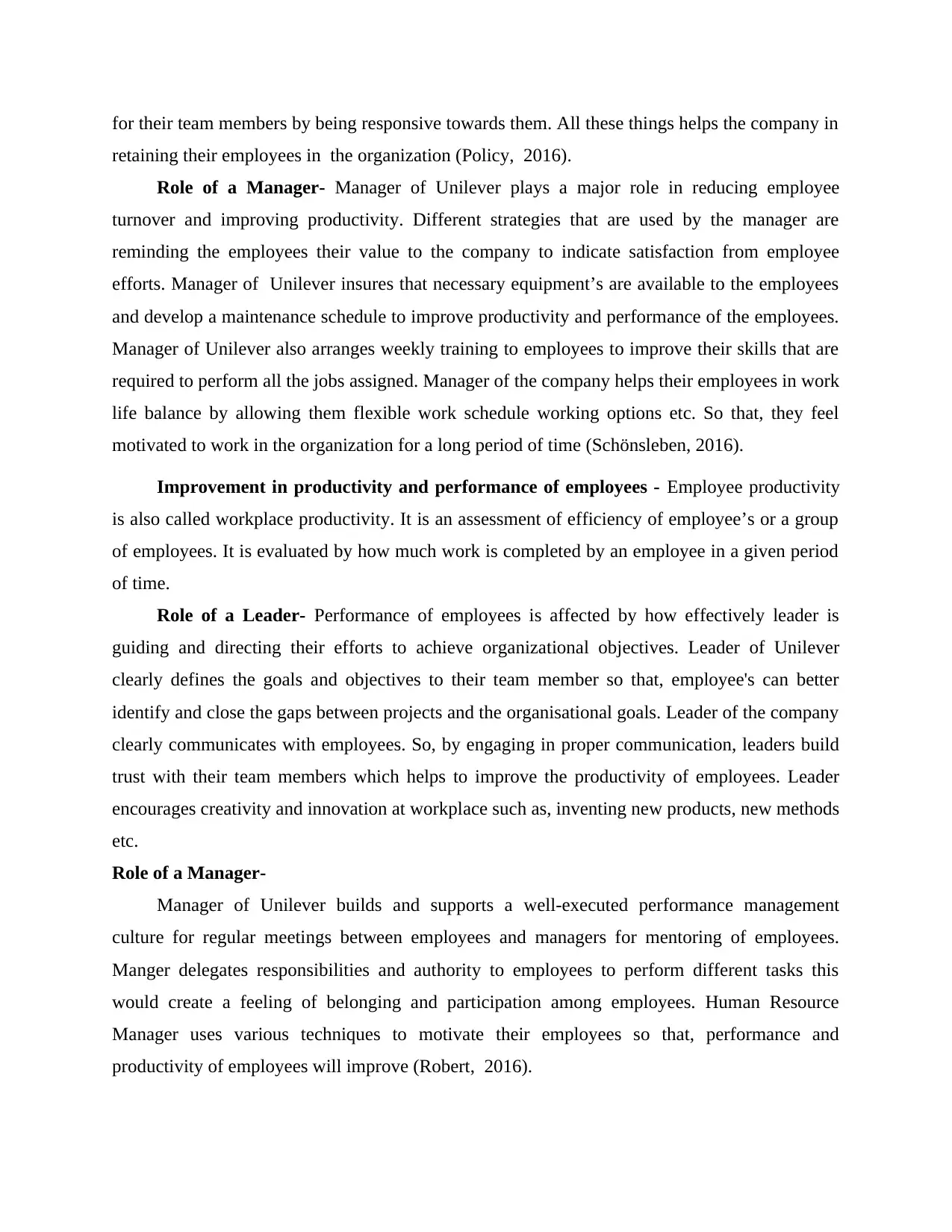
for their team members by being responsive towards them. All these things helps the company in
retaining their employees in the organization (Policy, 2016).
Role of a Manager- Manager of Unilever plays a major role in reducing employee
turnover and improving productivity. Different strategies that are used by the manager are
reminding the employees their value to the company to indicate satisfaction from employee
efforts. Manager of Unilever insures that necessary equipment’s are available to the employees
and develop a maintenance schedule to improve productivity and performance of the employees.
Manager of Unilever also arranges weekly training to employees to improve their skills that are
required to perform all the jobs assigned. Manager of the company helps their employees in work
life balance by allowing them flexible work schedule working options etc. So that, they feel
motivated to work in the organization for a long period of time (Schönsleben, 2016).
Improvement in productivity and performance of employees - Employee productivity
is also called workplace productivity. It is an assessment of efficiency of employee’s or a group
of employees. It is evaluated by how much work is completed by an employee in a given period
of time.
Role of a Leader- Performance of employees is affected by how effectively leader is
guiding and directing their efforts to achieve organizational objectives. Leader of Unilever
clearly defines the goals and objectives to their team member so that, employee's can better
identify and close the gaps between projects and the organisational goals. Leader of the company
clearly communicates with employees. So, by engaging in proper communication, leaders build
trust with their team members which helps to improve the productivity of employees. Leader
encourages creativity and innovation at workplace such as, inventing new products, new methods
etc.
Role of a Manager-
Manager of Unilever builds and supports a well-executed performance management
culture for regular meetings between employees and managers for mentoring of employees.
Manger delegates responsibilities and authority to employees to perform different tasks this
would create a feeling of belonging and participation among employees. Human Resource
Manager uses various techniques to motivate their employees so that, performance and
productivity of employees will improve (Robert, 2016).
retaining their employees in the organization (Policy, 2016).
Role of a Manager- Manager of Unilever plays a major role in reducing employee
turnover and improving productivity. Different strategies that are used by the manager are
reminding the employees their value to the company to indicate satisfaction from employee
efforts. Manager of Unilever insures that necessary equipment’s are available to the employees
and develop a maintenance schedule to improve productivity and performance of the employees.
Manager of Unilever also arranges weekly training to employees to improve their skills that are
required to perform all the jobs assigned. Manager of the company helps their employees in work
life balance by allowing them flexible work schedule working options etc. So that, they feel
motivated to work in the organization for a long period of time (Schönsleben, 2016).
Improvement in productivity and performance of employees - Employee productivity
is also called workplace productivity. It is an assessment of efficiency of employee’s or a group
of employees. It is evaluated by how much work is completed by an employee in a given period
of time.
Role of a Leader- Performance of employees is affected by how effectively leader is
guiding and directing their efforts to achieve organizational objectives. Leader of Unilever
clearly defines the goals and objectives to their team member so that, employee's can better
identify and close the gaps between projects and the organisational goals. Leader of the company
clearly communicates with employees. So, by engaging in proper communication, leaders build
trust with their team members which helps to improve the productivity of employees. Leader
encourages creativity and innovation at workplace such as, inventing new products, new methods
etc.
Role of a Manager-
Manager of Unilever builds and supports a well-executed performance management
culture for regular meetings between employees and managers for mentoring of employees.
Manger delegates responsibilities and authority to employees to perform different tasks this
would create a feeling of belonging and participation among employees. Human Resource
Manager uses various techniques to motivate their employees so that, performance and
productivity of employees will improve (Robert, 2016).
⊘ This is a preview!⊘
Do you want full access?
Subscribe today to unlock all pages.

Trusted by 1+ million students worldwide
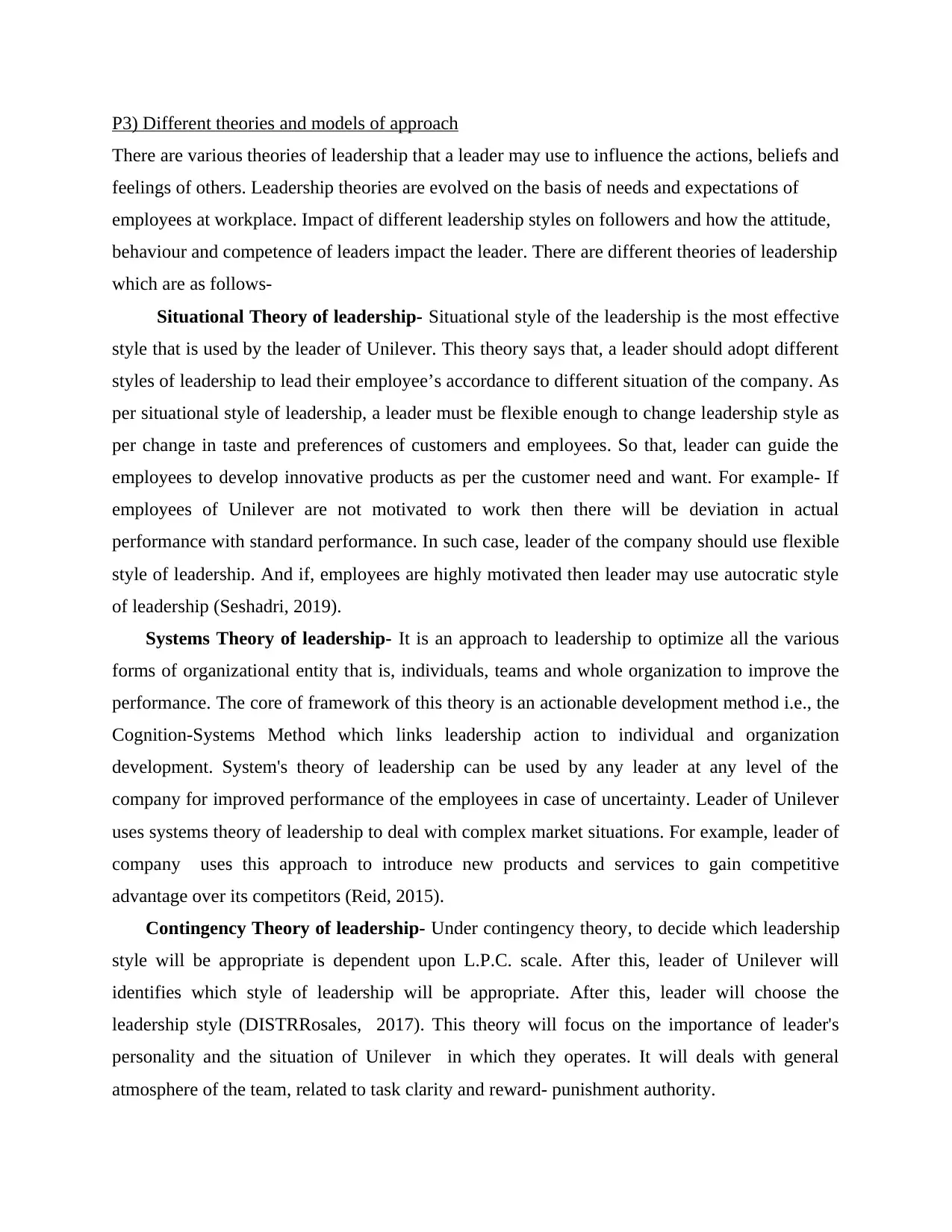
P3) Different theories and models of approach
There are various theories of leadership that a leader may use to influence the actions, beliefs and
feelings of others. Leadership theories are evolved on the basis of needs and expectations of
employees at workplace. Impact of different leadership styles on followers and how the attitude,
behaviour and competence of leaders impact the leader. There are different theories of leadership
which are as follows-
Situational Theory of leadership- Situational style of the leadership is the most effective
style that is used by the leader of Unilever. This theory says that, a leader should adopt different
styles of leadership to lead their employee’s accordance to different situation of the company. As
per situational style of leadership, a leader must be flexible enough to change leadership style as
per change in taste and preferences of customers and employees. So that, leader can guide the
employees to develop innovative products as per the customer need and want. For example- If
employees of Unilever are not motivated to work then there will be deviation in actual
performance with standard performance. In such case, leader of the company should use flexible
style of leadership. And if, employees are highly motivated then leader may use autocratic style
of leadership (Seshadri, 2019).
Systems Theory of leadership- It is an approach to leadership to optimize all the various
forms of organizational entity that is, individuals, teams and whole organization to improve the
performance. The core of framework of this theory is an actionable development method i.e., the
Cognition-Systems Method which links leadership action to individual and organization
development. System's theory of leadership can be used by any leader at any level of the
company for improved performance of the employees in case of uncertainty. Leader of Unilever
uses systems theory of leadership to deal with complex market situations. For example, leader of
company uses this approach to introduce new products and services to gain competitive
advantage over its competitors (Reid, 2015).
Contingency Theory of leadership- Under contingency theory, to decide which leadership
style will be appropriate is dependent upon L.P.C. scale. After this, leader of Unilever will
identifies which style of leadership will be appropriate. After this, leader will choose the
leadership style (DISTRRosales, 2017). This theory will focus on the importance of leader's
personality and the situation of Unilever in which they operates. It will deals with general
atmosphere of the team, related to task clarity and reward- punishment authority.
There are various theories of leadership that a leader may use to influence the actions, beliefs and
feelings of others. Leadership theories are evolved on the basis of needs and expectations of
employees at workplace. Impact of different leadership styles on followers and how the attitude,
behaviour and competence of leaders impact the leader. There are different theories of leadership
which are as follows-
Situational Theory of leadership- Situational style of the leadership is the most effective
style that is used by the leader of Unilever. This theory says that, a leader should adopt different
styles of leadership to lead their employee’s accordance to different situation of the company. As
per situational style of leadership, a leader must be flexible enough to change leadership style as
per change in taste and preferences of customers and employees. So that, leader can guide the
employees to develop innovative products as per the customer need and want. For example- If
employees of Unilever are not motivated to work then there will be deviation in actual
performance with standard performance. In such case, leader of the company should use flexible
style of leadership. And if, employees are highly motivated then leader may use autocratic style
of leadership (Seshadri, 2019).
Systems Theory of leadership- It is an approach to leadership to optimize all the various
forms of organizational entity that is, individuals, teams and whole organization to improve the
performance. The core of framework of this theory is an actionable development method i.e., the
Cognition-Systems Method which links leadership action to individual and organization
development. System's theory of leadership can be used by any leader at any level of the
company for improved performance of the employees in case of uncertainty. Leader of Unilever
uses systems theory of leadership to deal with complex market situations. For example, leader of
company uses this approach to introduce new products and services to gain competitive
advantage over its competitors (Reid, 2015).
Contingency Theory of leadership- Under contingency theory, to decide which leadership
style will be appropriate is dependent upon L.P.C. scale. After this, leader of Unilever will
identifies which style of leadership will be appropriate. After this, leader will choose the
leadership style (DISTRRosales, 2017). This theory will focus on the importance of leader's
personality and the situation of Unilever in which they operates. It will deals with general
atmosphere of the team, related to task clarity and reward- punishment authority.
Paraphrase This Document
Need a fresh take? Get an instant paraphrase of this document with our AI Paraphraser
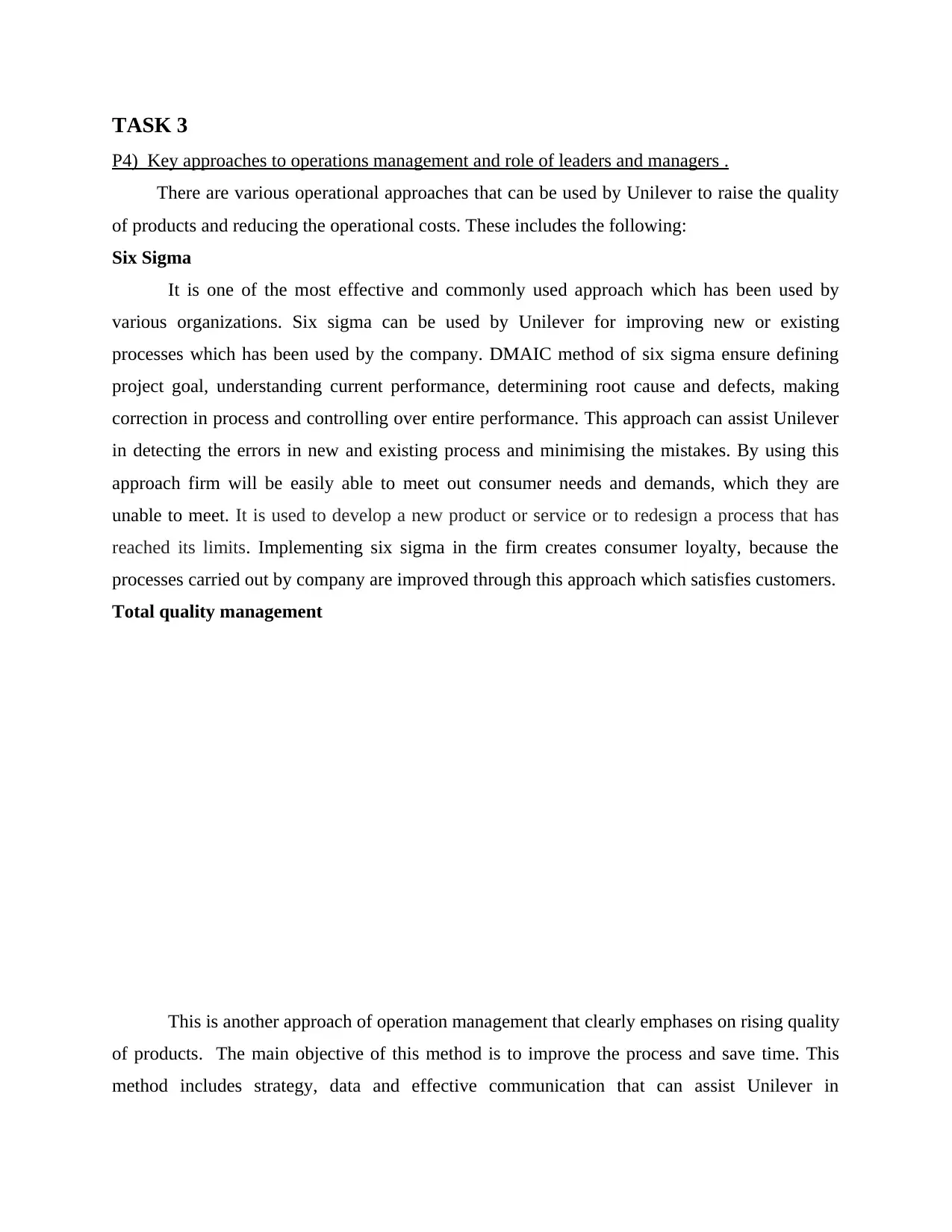
TASK 3
P4) Key approaches to operations management and role of leaders and managers .
There are various operational approaches that can be used by Unilever to raise the quality
of products and reducing the operational costs. These includes the following:
Six Sigma
It is one of the most effective and commonly used approach which has been used by
various organizations. Six sigma can be used by Unilever for improving new or existing
processes which has been used by the company. DMAIC method of six sigma ensure defining
project goal, understanding current performance, determining root cause and defects, making
correction in process and controlling over entire performance. This approach can assist Unilever
in detecting the errors in new and existing process and minimising the mistakes. By using this
approach firm will be easily able to meet out consumer needs and demands, which they are
unable to meet. It is used to develop a new product or service or to redesign a process that has
reached its limits. Implementing six sigma in the firm creates consumer loyalty, because the
processes carried out by company are improved through this approach which satisfies customers.
Total quality management
This is another approach of operation management that clearly emphases on rising quality
of products. The main objective of this method is to improve the process and save time. This
method includes strategy, data and effective communication that can assist Unilever in
P4) Key approaches to operations management and role of leaders and managers .
There are various operational approaches that can be used by Unilever to raise the quality
of products and reducing the operational costs. These includes the following:
Six Sigma
It is one of the most effective and commonly used approach which has been used by
various organizations. Six sigma can be used by Unilever for improving new or existing
processes which has been used by the company. DMAIC method of six sigma ensure defining
project goal, understanding current performance, determining root cause and defects, making
correction in process and controlling over entire performance. This approach can assist Unilever
in detecting the errors in new and existing process and minimising the mistakes. By using this
approach firm will be easily able to meet out consumer needs and demands, which they are
unable to meet. It is used to develop a new product or service or to redesign a process that has
reached its limits. Implementing six sigma in the firm creates consumer loyalty, because the
processes carried out by company are improved through this approach which satisfies customers.
Total quality management
This is another approach of operation management that clearly emphases on rising quality
of products. The main objective of this method is to improve the process and save time. This
method includes strategy, data and effective communication that can assist Unilever in
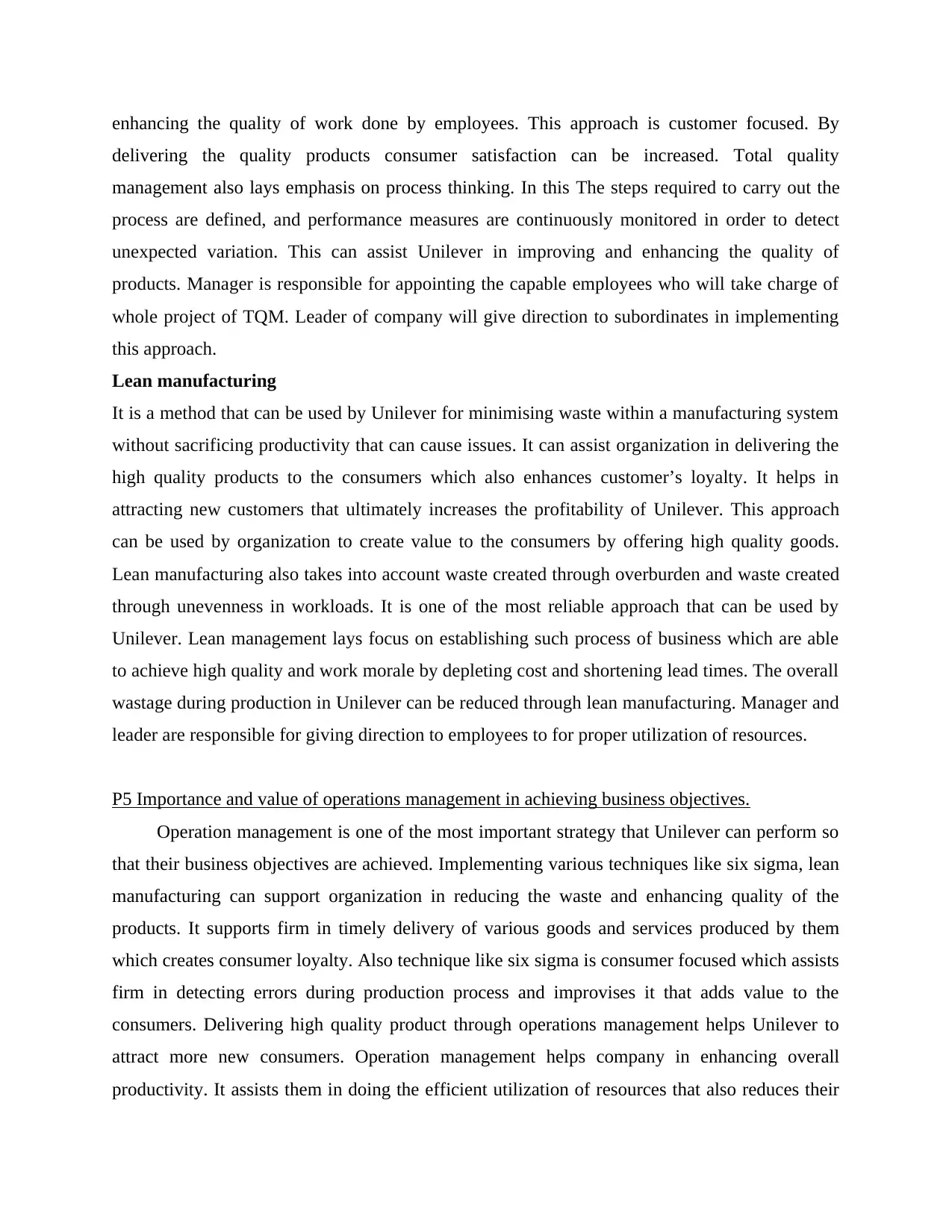
enhancing the quality of work done by employees. This approach is customer focused. By
delivering the quality products consumer satisfaction can be increased. Total quality
management also lays emphasis on process thinking. In this The steps required to carry out the
process are defined, and performance measures are continuously monitored in order to detect
unexpected variation. This can assist Unilever in improving and enhancing the quality of
products. Manager is responsible for appointing the capable employees who will take charge of
whole project of TQM. Leader of company will give direction to subordinates in implementing
this approach.
Lean manufacturing
It is a method that can be used by Unilever for minimising waste within a manufacturing system
without sacrificing productivity that can cause issues. It can assist organization in delivering the
high quality products to the consumers which also enhances customer’s loyalty. It helps in
attracting new customers that ultimately increases the profitability of Unilever. This approach
can be used by organization to create value to the consumers by offering high quality goods.
Lean manufacturing also takes into account waste created through overburden and waste created
through unevenness in workloads. It is one of the most reliable approach that can be used by
Unilever. Lean management lays focus on establishing such process of business which are able
to achieve high quality and work morale by depleting cost and shortening lead times. The overall
wastage during production in Unilever can be reduced through lean manufacturing. Manager and
leader are responsible for giving direction to employees to for proper utilization of resources.
P5 Importance and value of operations management in achieving business objectives.
Operation management is one of the most important strategy that Unilever can perform so
that their business objectives are achieved. Implementing various techniques like six sigma, lean
manufacturing can support organization in reducing the waste and enhancing quality of the
products. It supports firm in timely delivery of various goods and services produced by them
which creates consumer loyalty. Also technique like six sigma is consumer focused which assists
firm in detecting errors during production process and improvises it that adds value to the
consumers. Delivering high quality product through operations management helps Unilever to
attract more new consumers. Operation management helps company in enhancing overall
productivity. It assists them in doing the efficient utilization of resources that also reduces their
delivering the quality products consumer satisfaction can be increased. Total quality
management also lays emphasis on process thinking. In this The steps required to carry out the
process are defined, and performance measures are continuously monitored in order to detect
unexpected variation. This can assist Unilever in improving and enhancing the quality of
products. Manager is responsible for appointing the capable employees who will take charge of
whole project of TQM. Leader of company will give direction to subordinates in implementing
this approach.
Lean manufacturing
It is a method that can be used by Unilever for minimising waste within a manufacturing system
without sacrificing productivity that can cause issues. It can assist organization in delivering the
high quality products to the consumers which also enhances customer’s loyalty. It helps in
attracting new customers that ultimately increases the profitability of Unilever. This approach
can be used by organization to create value to the consumers by offering high quality goods.
Lean manufacturing also takes into account waste created through overburden and waste created
through unevenness in workloads. It is one of the most reliable approach that can be used by
Unilever. Lean management lays focus on establishing such process of business which are able
to achieve high quality and work morale by depleting cost and shortening lead times. The overall
wastage during production in Unilever can be reduced through lean manufacturing. Manager and
leader are responsible for giving direction to employees to for proper utilization of resources.
P5 Importance and value of operations management in achieving business objectives.
Operation management is one of the most important strategy that Unilever can perform so
that their business objectives are achieved. Implementing various techniques like six sigma, lean
manufacturing can support organization in reducing the waste and enhancing quality of the
products. It supports firm in timely delivery of various goods and services produced by them
which creates consumer loyalty. Also technique like six sigma is consumer focused which assists
firm in detecting errors during production process and improvises it that adds value to the
consumers. Delivering high quality product through operations management helps Unilever to
attract more new consumers. Operation management helps company in enhancing overall
productivity. It assists them in doing the efficient utilization of resources that also reduces their
⊘ This is a preview!⊘
Do you want full access?
Subscribe today to unlock all pages.

Trusted by 1+ million students worldwide
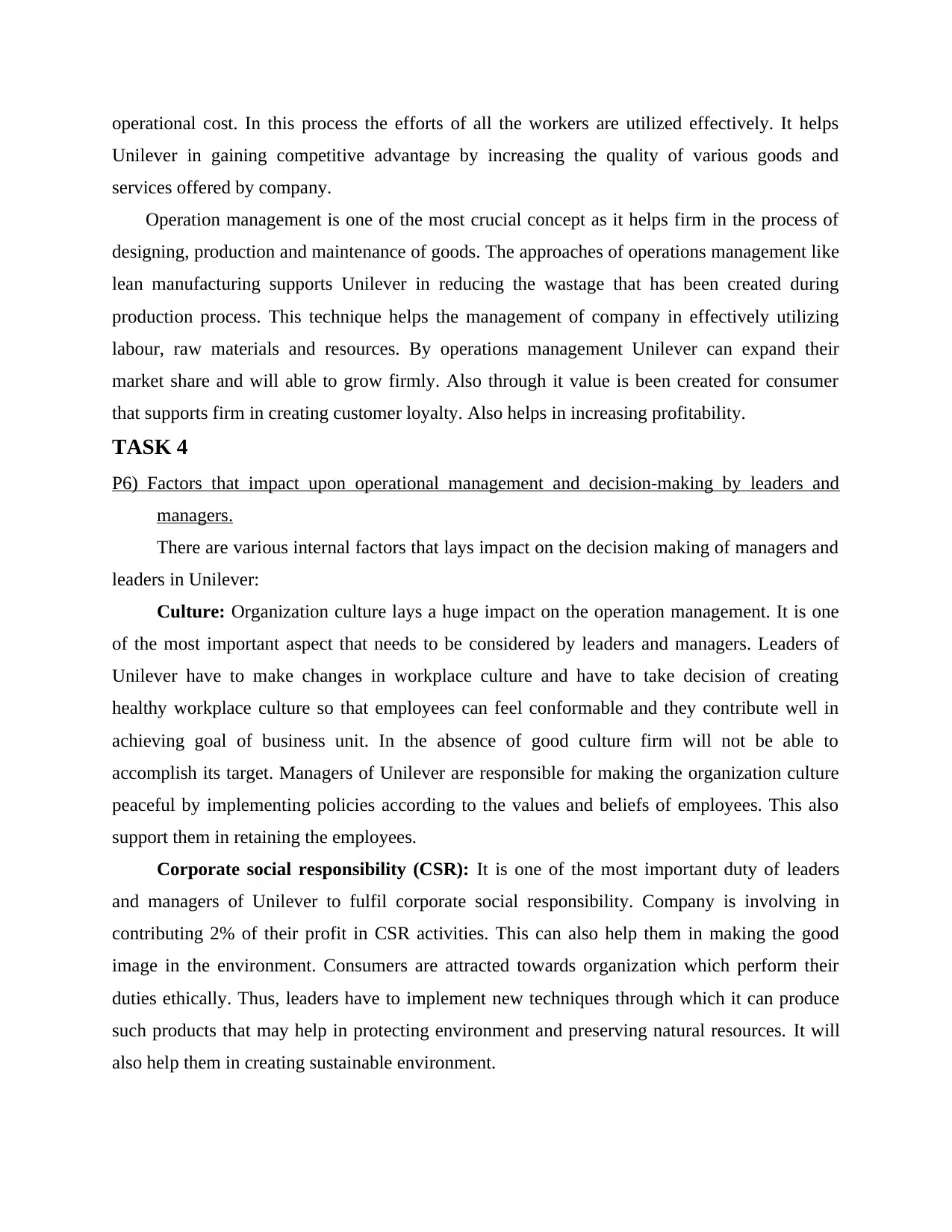
operational cost. In this process the efforts of all the workers are utilized effectively. It helps
Unilever in gaining competitive advantage by increasing the quality of various goods and
services offered by company.
Operation management is one of the most crucial concept as it helps firm in the process of
designing, production and maintenance of goods. The approaches of operations management like
lean manufacturing supports Unilever in reducing the wastage that has been created during
production process. This technique helps the management of company in effectively utilizing
labour, raw materials and resources. By operations management Unilever can expand their
market share and will able to grow firmly. Also through it value is been created for consumer
that supports firm in creating customer loyalty. Also helps in increasing profitability.
TASK 4
P6) Factors that impact upon operational management and decision-making by leaders and
managers.
There are various internal factors that lays impact on the decision making of managers and
leaders in Unilever:
Culture: Organization culture lays a huge impact on the operation management. It is one
of the most important aspect that needs to be considered by leaders and managers. Leaders of
Unilever have to make changes in workplace culture and have to take decision of creating
healthy workplace culture so that employees can feel conformable and they contribute well in
achieving goal of business unit. In the absence of good culture firm will not be able to
accomplish its target. Managers of Unilever are responsible for making the organization culture
peaceful by implementing policies according to the values and beliefs of employees. This also
support them in retaining the employees.
Corporate social responsibility (CSR): It is one of the most important duty of leaders
and managers of Unilever to fulfil corporate social responsibility. Company is involving in
contributing 2% of their profit in CSR activities. This can also help them in making the good
image in the environment. Consumers are attracted towards organization which perform their
duties ethically. Thus, leaders have to implement new techniques through which it can produce
such products that may help in protecting environment and preserving natural resources. It will
also help them in creating sustainable environment.
Unilever in gaining competitive advantage by increasing the quality of various goods and
services offered by company.
Operation management is one of the most crucial concept as it helps firm in the process of
designing, production and maintenance of goods. The approaches of operations management like
lean manufacturing supports Unilever in reducing the wastage that has been created during
production process. This technique helps the management of company in effectively utilizing
labour, raw materials and resources. By operations management Unilever can expand their
market share and will able to grow firmly. Also through it value is been created for consumer
that supports firm in creating customer loyalty. Also helps in increasing profitability.
TASK 4
P6) Factors that impact upon operational management and decision-making by leaders and
managers.
There are various internal factors that lays impact on the decision making of managers and
leaders in Unilever:
Culture: Organization culture lays a huge impact on the operation management. It is one
of the most important aspect that needs to be considered by leaders and managers. Leaders of
Unilever have to make changes in workplace culture and have to take decision of creating
healthy workplace culture so that employees can feel conformable and they contribute well in
achieving goal of business unit. In the absence of good culture firm will not be able to
accomplish its target. Managers of Unilever are responsible for making the organization culture
peaceful by implementing policies according to the values and beliefs of employees. This also
support them in retaining the employees.
Corporate social responsibility (CSR): It is one of the most important duty of leaders
and managers of Unilever to fulfil corporate social responsibility. Company is involving in
contributing 2% of their profit in CSR activities. This can also help them in making the good
image in the environment. Consumers are attracted towards organization which perform their
duties ethically. Thus, leaders have to implement new techniques through which it can produce
such products that may help in protecting environment and preserving natural resources. It will
also help them in creating sustainable environment.
Paraphrase This Document
Need a fresh take? Get an instant paraphrase of this document with our AI Paraphraser
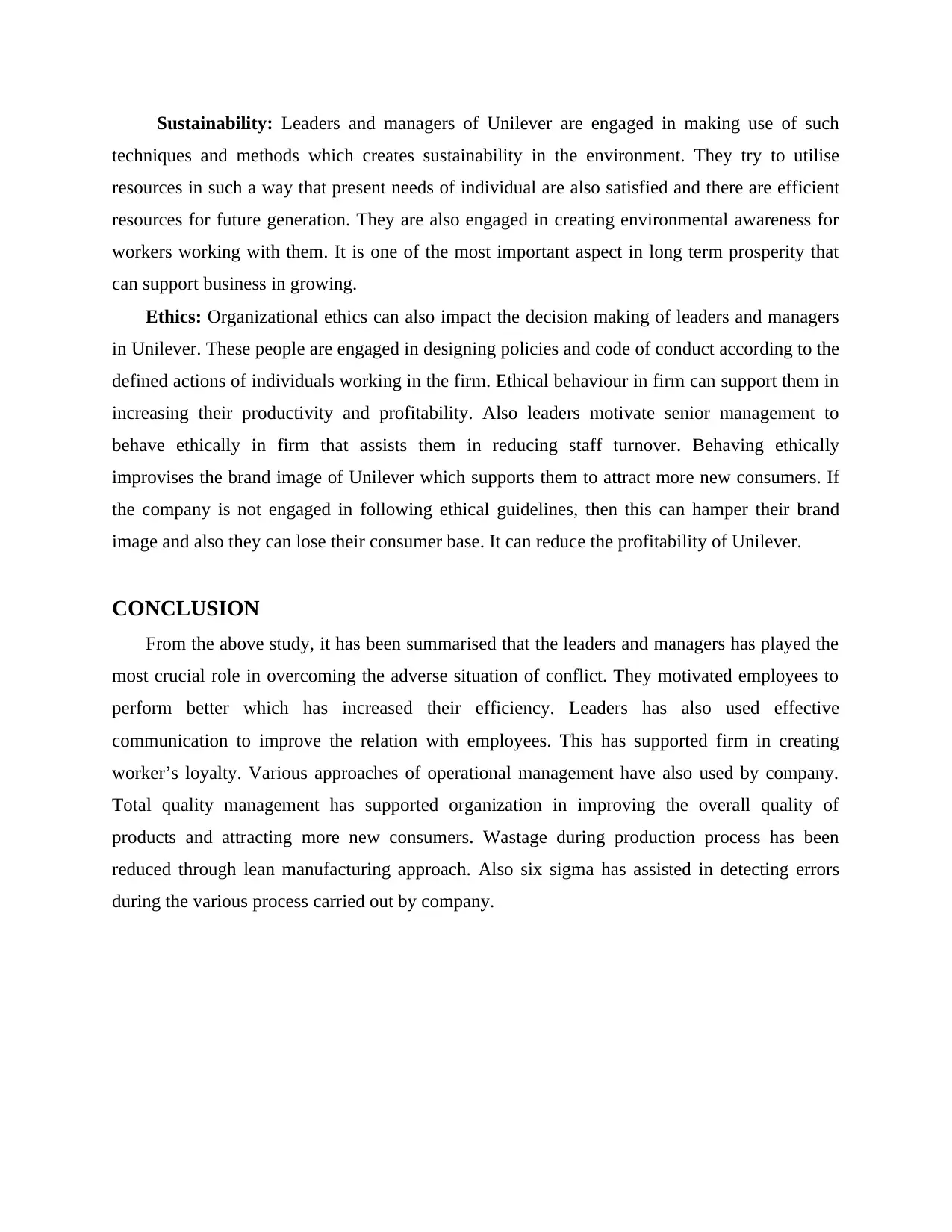
Sustainability: Leaders and managers of Unilever are engaged in making use of such
techniques and methods which creates sustainability in the environment. They try to utilise
resources in such a way that present needs of individual are also satisfied and there are efficient
resources for future generation. They are also engaged in creating environmental awareness for
workers working with them. It is one of the most important aspect in long term prosperity that
can support business in growing.
Ethics: Organizational ethics can also impact the decision making of leaders and managers
in Unilever. These people are engaged in designing policies and code of conduct according to the
defined actions of individuals working in the firm. Ethical behaviour in firm can support them in
increasing their productivity and profitability. Also leaders motivate senior management to
behave ethically in firm that assists them in reducing staff turnover. Behaving ethically
improvises the brand image of Unilever which supports them to attract more new consumers. If
the company is not engaged in following ethical guidelines, then this can hamper their brand
image and also they can lose their consumer base. It can reduce the profitability of Unilever.
CONCLUSION
From the above study, it has been summarised that the leaders and managers has played the
most crucial role in overcoming the adverse situation of conflict. They motivated employees to
perform better which has increased their efficiency. Leaders has also used effective
communication to improve the relation with employees. This has supported firm in creating
worker’s loyalty. Various approaches of operational management have also used by company.
Total quality management has supported organization in improving the overall quality of
products and attracting more new consumers. Wastage during production process has been
reduced through lean manufacturing approach. Also six sigma has assisted in detecting errors
during the various process carried out by company.
techniques and methods which creates sustainability in the environment. They try to utilise
resources in such a way that present needs of individual are also satisfied and there are efficient
resources for future generation. They are also engaged in creating environmental awareness for
workers working with them. It is one of the most important aspect in long term prosperity that
can support business in growing.
Ethics: Organizational ethics can also impact the decision making of leaders and managers
in Unilever. These people are engaged in designing policies and code of conduct according to the
defined actions of individuals working in the firm. Ethical behaviour in firm can support them in
increasing their productivity and profitability. Also leaders motivate senior management to
behave ethically in firm that assists them in reducing staff turnover. Behaving ethically
improvises the brand image of Unilever which supports them to attract more new consumers. If
the company is not engaged in following ethical guidelines, then this can hamper their brand
image and also they can lose their consumer base. It can reduce the profitability of Unilever.
CONCLUSION
From the above study, it has been summarised that the leaders and managers has played the
most crucial role in overcoming the adverse situation of conflict. They motivated employees to
perform better which has increased their efficiency. Leaders has also used effective
communication to improve the relation with employees. This has supported firm in creating
worker’s loyalty. Various approaches of operational management have also used by company.
Total quality management has supported organization in improving the overall quality of
products and attracting more new consumers. Wastage during production process has been
reduced through lean manufacturing approach. Also six sigma has assisted in detecting errors
during the various process carried out by company.
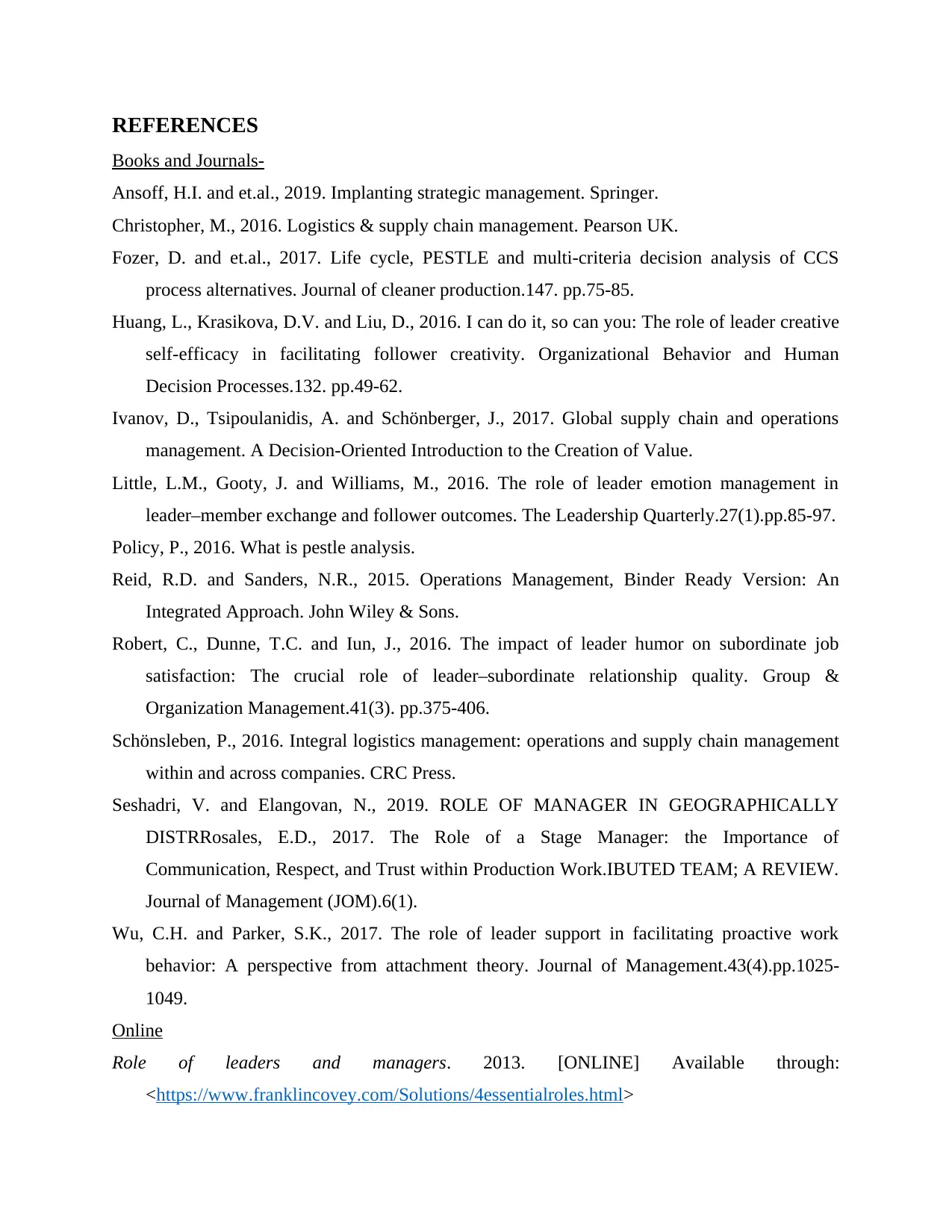
REFERENCES
Books and Journals-
Ansoff, H.I. and et.al., 2019. Implanting strategic management. Springer.
Christopher, M., 2016. Logistics & supply chain management. Pearson UK.
Fozer, D. and et.al., 2017. Life cycle, PESTLE and multi-criteria decision analysis of CCS
process alternatives. Journal of cleaner production.147. pp.75-85.
Huang, L., Krasikova, D.V. and Liu, D., 2016. I can do it, so can you: The role of leader creative
self-efficacy in facilitating follower creativity. Organizational Behavior and Human
Decision Processes.132. pp.49-62.
Ivanov, D., Tsipoulanidis, A. and Schönberger, J., 2017. Global supply chain and operations
management. A Decision-Oriented Introduction to the Creation of Value.
Little, L.M., Gooty, J. and Williams, M., 2016. The role of leader emotion management in
leader–member exchange and follower outcomes. The Leadership Quarterly.27(1).pp.85-97.
Policy, P., 2016. What is pestle analysis.
Reid, R.D. and Sanders, N.R., 2015. Operations Management, Binder Ready Version: An
Integrated Approach. John Wiley & Sons.
Robert, C., Dunne, T.C. and Iun, J., 2016. The impact of leader humor on subordinate job
satisfaction: The crucial role of leader–subordinate relationship quality. Group &
Organization Management.41(3). pp.375-406.
Schönsleben, P., 2016. Integral logistics management: operations and supply chain management
within and across companies. CRC Press.
Seshadri, V. and Elangovan, N., 2019. ROLE OF MANAGER IN GEOGRAPHICALLY
DISTRRosales, E.D., 2017. The Role of a Stage Manager: the Importance of
Communication, Respect, and Trust within Production Work.IBUTED TEAM; A REVIEW.
Journal of Management (JOM).6(1).
Wu, C.H. and Parker, S.K., 2017. The role of leader support in facilitating proactive work
behavior: A perspective from attachment theory. Journal of Management.43(4).pp.1025-
1049.
Online
Role of leaders and managers. 2013. [ONLINE] Available through:
<https://www.franklincovey.com/Solutions/4essentialroles.html>
Books and Journals-
Ansoff, H.I. and et.al., 2019. Implanting strategic management. Springer.
Christopher, M., 2016. Logistics & supply chain management. Pearson UK.
Fozer, D. and et.al., 2017. Life cycle, PESTLE and multi-criteria decision analysis of CCS
process alternatives. Journal of cleaner production.147. pp.75-85.
Huang, L., Krasikova, D.V. and Liu, D., 2016. I can do it, so can you: The role of leader creative
self-efficacy in facilitating follower creativity. Organizational Behavior and Human
Decision Processes.132. pp.49-62.
Ivanov, D., Tsipoulanidis, A. and Schönberger, J., 2017. Global supply chain and operations
management. A Decision-Oriented Introduction to the Creation of Value.
Little, L.M., Gooty, J. and Williams, M., 2016. The role of leader emotion management in
leader–member exchange and follower outcomes. The Leadership Quarterly.27(1).pp.85-97.
Policy, P., 2016. What is pestle analysis.
Reid, R.D. and Sanders, N.R., 2015. Operations Management, Binder Ready Version: An
Integrated Approach. John Wiley & Sons.
Robert, C., Dunne, T.C. and Iun, J., 2016. The impact of leader humor on subordinate job
satisfaction: The crucial role of leader–subordinate relationship quality. Group &
Organization Management.41(3). pp.375-406.
Schönsleben, P., 2016. Integral logistics management: operations and supply chain management
within and across companies. CRC Press.
Seshadri, V. and Elangovan, N., 2019. ROLE OF MANAGER IN GEOGRAPHICALLY
DISTRRosales, E.D., 2017. The Role of a Stage Manager: the Importance of
Communication, Respect, and Trust within Production Work.IBUTED TEAM; A REVIEW.
Journal of Management (JOM).6(1).
Wu, C.H. and Parker, S.K., 2017. The role of leader support in facilitating proactive work
behavior: A perspective from attachment theory. Journal of Management.43(4).pp.1025-
1049.
Online
Role of leaders and managers. 2013. [ONLINE] Available through:
<https://www.franklincovey.com/Solutions/4essentialroles.html>
⊘ This is a preview!⊘
Do you want full access?
Subscribe today to unlock all pages.

Trusted by 1+ million students worldwide
1 out of 13
Related Documents
Your All-in-One AI-Powered Toolkit for Academic Success.
+13062052269
info@desklib.com
Available 24*7 on WhatsApp / Email
![[object Object]](/_next/static/media/star-bottom.7253800d.svg)
Unlock your academic potential
Copyright © 2020–2026 A2Z Services. All Rights Reserved. Developed and managed by ZUCOL.





